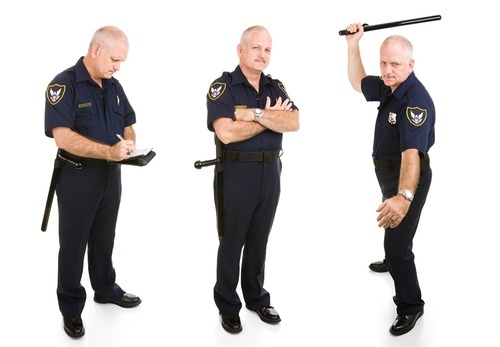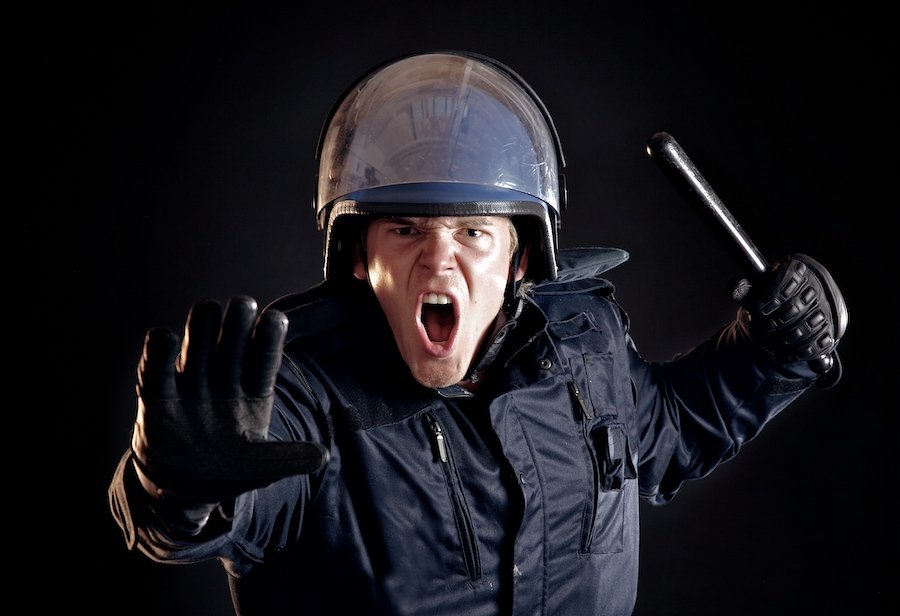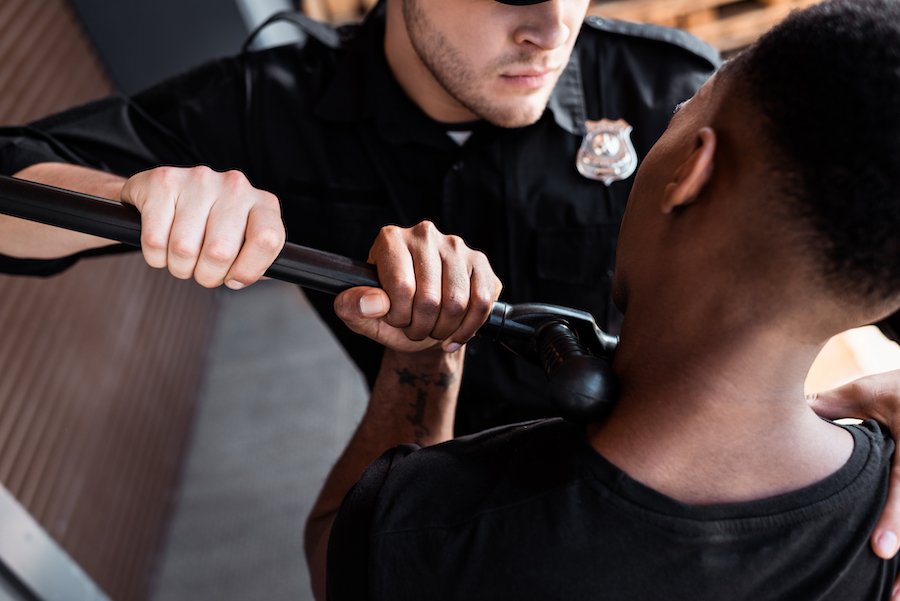If your civil rights have been violated by Nevada police, you may be able to sue for money damages, press criminal charges, and/or file a police misconduct report. Though many law enforcement officers behave ethically, sometimes they intentionally or mistakenly commit misconduct, including:
- using excessive force,
- allowing “K9” dogs to bite or maul you,
- neglecting your health while you are in custody,
- falsely detaining or arresting you, and
- profiling you based on race.
Whenever you may have had your civil rights denied by police, it is important to seek legal counsel to help you decide how best to proceed. Our Las Vegas police misconduct attorneys try not only to maximize your chances of receiving compensation but also to get the officers disciplined or possibly have their employment terminated.
In this article, our Nevada personal injury attorneys discuss:
- 1. Types of police misconduct
- 2. Suing police and recovering money
- 3. Pressing criminal charges against police
- 4. Filing a police misconduct report in Nevada
- Additional reading
1. Types of police misconduct in Nevada
Police misconduct occurs when law enforcement oversteps its bounds, violates rules, or breaks the law. Such behavior may be intentional or accidental, and it can happen anywhere, such as in:
- a courthouse,
- a jail,
- a police station,
- a home, and
- out on the street.
There are many possible reasons for police mistakes, including:
- insufficient training,
- poor judgment,
- peer pressure, or
- prejudice.
No matter the circumstances, officers may feel constrained by a “code of silence,” where they refuse to tell on their colleagues as part of a “protect our own” mentality.
This section discusses various police misbehavior that may violate your civil rights.

Victims of police misconduct can pursue civil and criminal charges.
Excessive physical force
Police belts hold:
- a gun(s),
- a knife,
- a taser,
- chemical spray,
- a baton, and
- handcuffs.
However, police are not permitted to touch you unnecessarily. Examples of excessive force include:
- beating you after you have already been captured and subdued
- sexual assault and misconduct
- an unconstitutional strip search
- unreasonable use of restraints
- pepper-spraying at a peaceful protest
Police brutality can cause devastating physical injuries or even death. Police who may have applied excessive physical force out of revenge, anger, frustration, or merely ignorance may be liable in both civil and criminal court.
Learn more in our articles on the unlawful use of deadly force by police and unlawful police shootings.
Police dog bites
Nevada police rely on dogs in their “K9” unit for various law enforcement purposes, including:
- detecting narcotics
- tracking suspects
- detecting cadavers
- detecting explosives
However, police are not allowed to permit their dogs to bite or maul you unnecessarily. In Reno, a man received a $17,500 settlement when a police dog mauled him after he already surrendered.1 Learn more in our article on police dog bites.
Medical neglect in jail or prison
If you are an inmate in jail or prison, you are legally entitled to adequate medical care, including:
- the dispensing of necessary medications (such as for diabetes, blood pressure, depression, etc.)
- dental care
- hospitalization when necessary
If you are deprived of adequate medical care while in custody, you may be able to sue. Learn more in our article on medical neglect in Nevada jails and prisons.
False arrest or unlawful detention
Detaining or placing you under arrest is an enormous deprivation of your freedom. Police who suspect you of a crime are allowed to detain you to ask questions, but for no longer than necessary. Also, police may go through with an arrest only if they have probable cause to believe you committed a crime.
If you were falsely arrested or unlawfully detained, you may have legal redress, and the officer may be:
- disciplined,
- fired, or
- possibly prosecuted criminally.
Learn more in our article on false imprisonment.
Racial profiling
Your race or ethnicity is supposed to play no part in how law enforcement investigates, apprehends, or treats you as a criminal suspect. Yet stories abound of African-American drivers getting pulled over and suspected of car theft for no reason other than their race. Plus, incarceration disproportionately affects people of color.
If you are a victim of police racial profiling in Nevada, you may have legal recourse. Learn more in our article on racial profiling by police in Nevada.
Other police misconduct
Other types of conduct that police are prohibited from engaging in include:
- coercing confessions
- fabricating, planting, or tampering with evidence
- false reporting or lying on the witness stand
- intimidation, harassment, or corruption
- improper firearm use
- unlawful searches and seizures
- other misuses of power
Depending on the case, you have a legal cause of action to sue. Furthermore, the offending officer may face criminal charges and termination of their employment.

Excessive force is common police misconduct.
2. Suing police for misconduct in Nevada
You may try to recover compensation for police misconduct by bringing a civil lawsuit against the individual officer(s) and/or the entire police agency (such as the Las Vegas Metropolitan Police Department). You can typically pursue one or both of the following causes of actions:
- civil tort claims
- constitutional claims
Civil tort claims
A tort is a wrongdoing that one person commits against someone else. Torts are similar to crimes except that crimes are prosecuted by the state against the alleged criminal, whereas torts are prosecuted by individual persons against each other.
Furthermore, only crimes — not torts — may carry prison time as a punishment. Common torts that you can sue law enforcement for include:
- battery lawsuits
- wrongful death lawsuits
- false detention or arrest lawsuits
- negligence lawsuits
Valuable evidence in civil tort claims includes your medical records, so be sure to seek medical attention as soon as possible following your injury.
Constitutional claims
The United States Constitution spells out various fundamental rights American citizens share that may not be compromised without just cause. Two frequently litigated constitutional issues in police misconduct cases are:
- The Fourth Amendment right to freedom from unreasonable searches and seizures. A violation occurs if the police conduct an illegal search by defying proper arrest warrant and search warrant procedures.
- The Eighth Amendment right to freedom from cruel and unusual punishment. A violation occurs if the police subject you to unreasonable pain or torment while incarcerated.
Section 1983 of the United States Code offers you a way to sue people who have seriously harmed you while acting under the “color of state law.” In order to prevail on a Section 1983 claim, you have to show all of the following:
- One of your constitutional rights was violated,
- The violation was perpetrated by someone acting under color of law (such as a police officer), and
- The state agent who committed the violation was not immune from liability
Learn more about filing Section 1983 claims in Nevada. Note that if the police officer was a federal employee as opposed to a state or city officer, you would bring a suit similar to a Section 1983 claim called a “Bivens claim.”2
Remedies
When police officers or agencies are found liable under tort or constitutional claims, the court may order them to pay you compensatory damages to help make up for the harm you suffered. Compensatory damages include reimbursement for:
- Medical bills for all your injuries, including rehab and home health care;
- Lost wages and lost earning potential for being too injured to work;
- Pain and suffering, which is often the steepest cost; and
- Attorney’s fees for bringing your lawsuit.
In some cases, the court may even order that the police department pay you punitive damages. The purpose of punitive damages is to punish the police and deter them from recommitting misconduct.
In addition, courts may order injunctive relief, such as requiring the police to take de-escalation training. You may also have the satisfaction of seeing the officials who have wronged you held accountable for their misconduct and abuse of power.
Finally, the court can grant you equitable remedies. An example is having your criminal record sealed so that it no longer appears on background checks, thereby improving your future employment prospects.
Statute of limitations
Note that there is a two-year statute of limitations to bring a police misconduct lawsuit in Nevada. This means you must file suit no later than two years after:
- the date of the police misconduct;
- the date you discovered your injury, which might not appear until well after the incident; and
- your 18th birthday, if you were injured when you were under 18.
If you file after the two-year statute of limitations, your case will likely be dismissed.3
3. Pressing criminal charges against police in Nevada
If the police misbehave to such an extent that their actions may qualify as criminal, then you may file a criminal complaint with the local district attorney’s office. The D.A. would then decide whether to investigate and prosecute the matter. Typical offenses police may be charged with include:
- Assault with a deadly weapon (NRS 200.471)
- Perjury, such as giving false information in a police report or lying on the witness stand (NRS 199.145)
- Extortion of confession (NRS 199.460)
- Malicious prosecution (NRS 199.310)
- Destroying evidence (NRS 199.220)
- Offering false evidence (NRS 199.210)
- Peace officer exceeding authority in execution of a search warrant (NRS 199.450)
If the officer pleads guilty or is found guilty, they may face prison, fines, and termination from their law enforcement job.4
Note that in a criminal case, you would not be a “party” to the case — only the officer and the state of Nevada would be litigating against each other. Instead, you could serve as a witness and help the state with its case against the accused officer.
4. Filing a police misconduct report in Nevada
A misconduct complaint is not the same as filing a civil complaint or filing a police report. All a misconduct complaint does is allow the applicable review board to issue reports and recommendations to the sheriff, who then decides whether to take action and discipline the police.
You should consult with an attorney to help guide you through filing a police misconduct report in Nevada. Every jurisdiction has its own rules, and any missteps may compromise its chances of success.
No matter the location, if you have been victim to or witnessed police misconduct in Nevada, you should immediately write down what happened in detail. This prevents important facts from being forgotten, which would weaken your case against the police. Ideally, the specifics should include the following:
- the police officer’s badge number
- any witnesses to the misconduct
- an in-depth narrative of exactly what happened when and where, including direct quotations
- hospital records (if the misconduct included physical abuse)
- photographs or video-recording of the abuse or its aftermath
Las Vegas Metropolitan Police Department
If you are a victim or witness to police misconduct in Las Vegas, you may file a complaint with the Las Vegas Metropolitan Police Department Citizen Review Board. If the board believes the complaint is credible, they will forward it to Metro’s Internal Affair’s Division for an investigation. There are four ways to contact the Citizen Review Board in Las Vegas:
- In Person: Go to the Citizen Review Board’s Office at 310 South 3rd Street, Ste. 319, Las Vegas, NV 89101 anytime on Monday through Friday from 7:30 AM to 4:30 PM to fill out a complaint.
- By Internet: Go to http://www.citizenreviewboard.com and click on the “complaint form” link. Then print out the complaint form, fill it out, and mail it to the above address.
- By Phone: Call the Citizen Review Board at (702) 455-6322. They can give you instructions on how to fill out a complaint.
- By E-mail: E-mail crbinfo@co.clark.nv.us to ask questions or express concerns to the Citizen Review Board.
Note that misconduct reports must be filed within one (1) year of the incident, but the time is tolled if there is an ongoing criminal investigation related to the matter. It is often best to wait until after all criminal and civil cases have been resolved so you do not reveal any potentially self-incriminating information. An attorney can help determine when you should file a report.
Depending on the case, an attorney may suggest that you send copies of the misconduct complaint to the local ACLU and NAACP chapters. They may decide to use the case to bring attention to issues of police misconduct.

The police’s bodycam footage holds valuable evidence of their misconduct.
Additional reading
For more in-depth information, refer to these scholarly articles:
- The Effect of Sanctions on Police Misconduct – Crime & Delinquency.
- Police Misconduct as a Cause of Wrongful Convictions – Washington University Law Review.
- Prosecuting Police Misconduct – Wisconsin Law Review.
- The Death of George Floyd, the Trial of Derek Chauvin, and Deadly-Force Encounters with Police: Have We Finally Reached an Inflection Point? Or Will the Cycle of Inaction Continue? – The Georgetown Law Journal Annual Review of Criminal Procedure.
- Organizational Justice and Police Misconduct – Criminal Justice and Behavior.
Legal References
- Anjeanette Damon, “Reno man mauled by police dog to get $17,500 settlement,” Reno Gazette-Journal (August 15, 2017).
- Bivens v. Six Unknown Named Agents (1971) 403 U.S. 388. See also Rivas-Villegas v. Cortesluna (2021) 142 S. Ct. 4.
- NRS 11.190.
- John Langeler, Lucas Wright, Metro Police chokehold death case remains unsettled several years later, KLAS (April 22, 2021).

